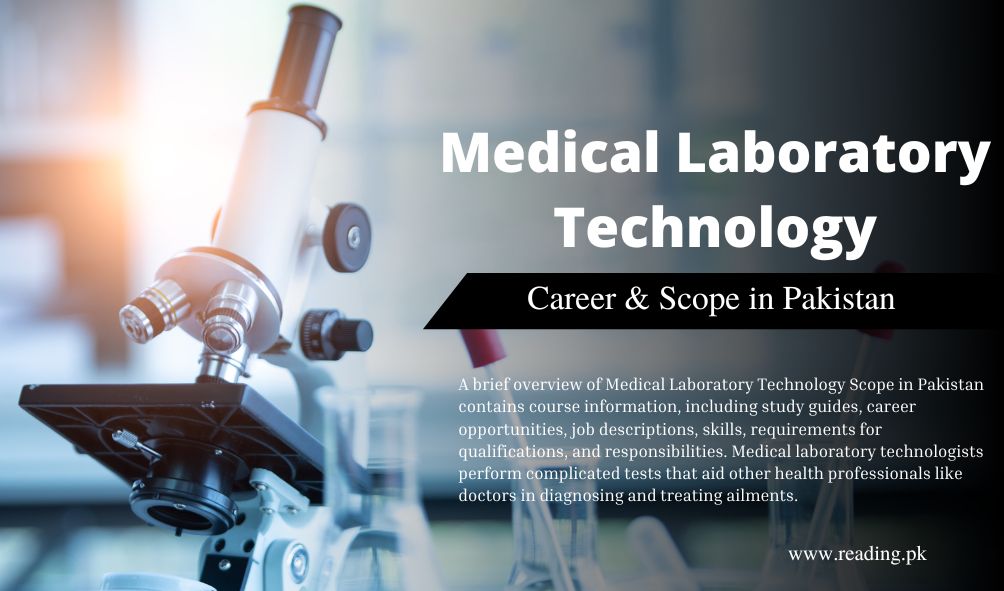Are you searching for the latest information on the Medical Laboratory Technology Scope in Pakistan? In Pakistan, Medical Laboratory Technology (MLT) has become a vital and active profession in the healthcare industry, exhibiting tremendous potential and development chances. MLT specialists are essential for diagnosing illnesses, keeping track of patient health, and making contributions to medical research as the nation’s healthcare infrastructure and services. evolve
In a country with over 220 million citizens, there is a growing need for precise diagnostic services, and MLT professionals are at the forefront of meeting this urgent need. MLT specialists are essential to the healthcare ecosystem because they perform blood tests, microbiological analysis, and pathology investigations as well as manage state-of-the-art laboratory equipment.
The capacity of Pakistan’s MLT area to adapt to new technologies and processes makes it unique. In an era of fast breakthroughs in medical technology, this flexibility is essential. The scope of the profession has also been expanded by the incorporation of MLT into telemedicine and telehealth services, which enables specialists to work remotely and visit underprivileged regions.
The importance of medical laboratory technology is still unmatched as Pakistan works to increase access to and the quality of its healthcare. MLT in Pakistan offers an interesting and constantly changing profession with limitless potential for people looking for a fulfilling career in healthcare that blends technology, accuracy, and service to mankind. Stay tuned as we investigate the many sides of this career, its educational opportunities, and how it influences the healthcare system in the country.
[lwptoc]
Medical Laboratory Technology Scope in Pakistan
The demand for health professionals in associated fields is now greater than the supply. Clinical lab scientists are in high demand right now. The practise environments available to students are diverse and include hospitals, independent labs, clinics, and public health institutions.
In addition to creating and studying novel diagnostic tests and tools, crime labs for forensics sell and market diagnostic tools and reagents to federal and state regulatory agencies. A master’s degree in laboratory sciences can furthermore serve as a great starting point for admission to professional programmes including dentistry, medicine, and pharmacy.
Medical Laboratory Technology Scope in Pakistan

Medical Laboratory Technology Courses
The primary curriculum subjects you study while earning this degree are listed below:
- Anatomy
- Blood banking
- Psychopathology
- Biochemistry
- Physiology
- Pathology
- Histopathology
- Information technology
- Islamic studies
- Pakistan studies
- Behavioral Sciences
- Serology
- Immunology
- Parasitology
- Hematology
Medical laboratory technology career scope in Pakistan
Hematologists
Hematology refers to the research of disorders with blood or blood. Hematologists are internal medicine physicians or pediatricians with additional knowledge of disorders involving the bone marrow, blood, and lymphatic system. They are specialists employed in blood banks, hospitals, or clinics. Hematologists who work in labs are known as hematologist. They are trained in pathology, a sub field of medicine that studies the body’s tissues and blood using microscopes or other tests.
Cytopathologist
Anatomic pathologists are experts at identifying human sickness through the examination of cells isolated from bodily fluids and fluids. They accomplish this by aspirating tumours or bodily organs with a very small needle while scraping, washing, or sponging over the surface of a lesion.
Clinical Chemists
A “clinical chemist” is a person who makes use of chemistry to evaluate the health of a patient. To assist medical professionals in the early diagnosis, treatment, and management of illnesses and health conditions, they perform medical tests and analysis.
They do blood tests, DNA research, tissue examinations, and cell analyses to achieve this. Additionally, clinical chemists may work as researchers or in the creation of diagnostic tools or processes. In these roles, clinical chemists make use of their knowledge to develop real-world applications for technical and scientific developments in, among other areas, transplant medicine and molecular biology.
Transfusion Biomedical Scientists
Transfusion Biomedical Scientists support the blood transfusion programs of hospitals’ blood banks. They prepare blood transfusions as well as plasma for administration to patients. They are also responsible for ensuring that the blood groups of patients and donors are compatible. Transfusion Biomedical Scientists typically specialize in one of the four fields: Biomedical Engineering, cell sciences, molecular pathology, and genetics.
Microbiologists in Clinical Practice
In order to aid in the diagnosis of illnesses, clinical microbiologists perform a wide range of laboratory tests utilising samples obtained from people, plants, and even animals. Medical researchers include clinical and medical microbiologists who conduct studies that have a direct impact on people’s health.
Responsibilities of Medical Technologists
Medical technologists are responsible for insuring the accuracy of testing and giving clinicians access to laboratory data. Medical technologists, often known as clinical laboratory scientists, work with highly expensive electronics, computers, and specialised equipment. Medical laboratory technologists need to be able to spot abnormalities in their tests and know how to remedy equipment issues.
They are able to filter, monitor, and debug public analyzers using the most latest technologies. The MLT is in charge of quality control, “on the fly” or run-by-run evaluation, statistical monitoring of the observations, and routine activity observations and records. The medical technologist is aware of the elements that might lead to a mistake and rejects them to assure the quality of the lab procedure.accept faulty or tainted samples.
The following are additional duties that medical technologists may have:
- To find symptoms of sickness, do intricate testing including microscopic studies of tissues, blood, and other physiological fluids. Chemical tests to measure blood cholesterol levels and the presence of fungus, bacteria, or parasites are other options.
- Technologists look at blood and other physiological fluids under a microscope.
- In order to identify the presence of fungus, bacteria, parasites, or other microorganisms, cultivate samples of bodily fluids and tissue.
- In order to ascertain the quantities of compounds like cholesterol and blood glucose levels, an analysis of samples is performed to ascertain the chemical composition or chemical reaction.
- Check that blood samples from transfusions match, and monitor drug levels in the blood to see how patients respond to the therapy.
- You are in charge of seeing that exams are completed on time.
- In certain labs, technicians conduct studies on behalf of medical researchers.
Required Skills
- work using a methodical approach.
- Able to handle sensitive scientific equipment with ease.
- Accurate and analytical.
- Ask questions regarding computers, science, technology, and medical.
- knowledgeable about learning new technology.
- Accuracy and efficiency in job performance.
Medical Laboratory Technologist salary in Pakistan
A DMLS or MLTS can work in a number of different positions as a Medical Laboratory Scientist (ASCP), Medical Technologists (AMT) or (AAB), also known as Med Techs, Pharmacy Techs, Radiographers, Respiratory Therapists, and Medical Technicians. Jobs and pay vary depending on your qualifications, level of education, job experience, and the hospital or institute where you are employed.
After completing a four-year BS programme, a medical laboratory scientist’s starting pay ranges from Rs. 25, 000 to Rs. 30, 000, whereas if you completed an FSc in pre-medicine and are working as an assistant or technician, your starting pay ranges from Rs. 15, 000 to Rs. 20, 000 per month.
